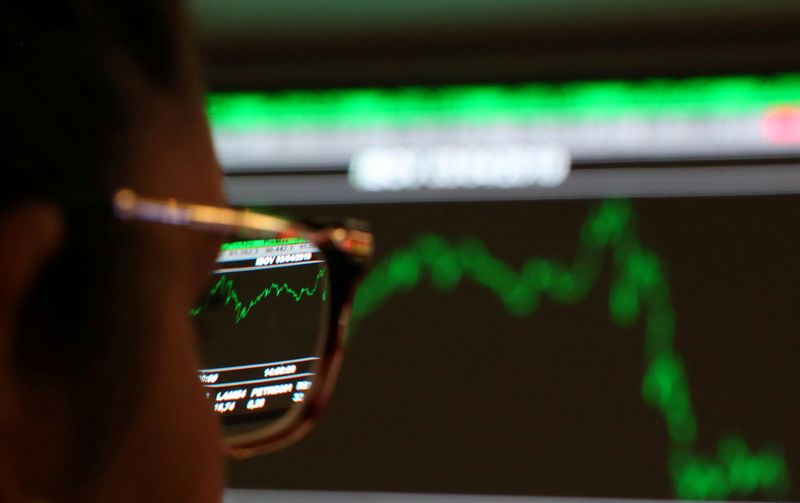By Carolina Mandl
SAO PAULO (Reuters) - What was shaping up as Brazil's best year for initial public offerings in more than a decade is now on the rocks, as many companies shelve their plans amid concerns on the country's fiscal discipline and a surfeit of new equity supply.
Fueled by surging demand from domestic retail investors seeking alternatives to historically low interest rates, local companies were expected to raise roughly 100 billion reais ($17.7 billion) by year-end in 2020 by selling their shares in IPOs and follow-ons.
But several companies' IPO hopes have been dashed in recent weeks. Even state-owned lender Caixa Economica Federal's planned flotation of its Caixa Seguridade SA insurance unit, which had aimed to raise more than 10 billion reais, collapsed last week. Cosan (NYSE:CZZ) SA's (SA:CSAN3) gas unit Compass and investment bank BR Partners met the same fate.
Many additional companies are also mulling cancellations, bankers say, as investor sentiment is soured both by concern about government overspending and by the sheer size of the pipeline of companies seeking to go public.
Others, such as homebuilder Lavvi and drugstore chain Pague Menos, yielded to pressure from investors and cut their initial valuations.
'ANEMIC'
This year, Brazilian IPOs have been mainly funded by local investors, fueled by record low benchmark interest rates at 2%. Foreign investors have accounted for 38% of the money in Brazilian IPOs this year, below the historic average level of 60% since 2007, giving domestic investors a lot of influence over pricings.
Cash equities have seen foreign investment outflows of some 90 billion reals so far this year, while local equity funds had inflows of over 60 billion reais, according to a recent Bank of America (NYSE:BAC) report.
"International investors' sentiment toward Brazil this year is anemic, with most showing preference for Chinese companies among emerging markets, especially tech IPOs," said Andre Rosenblit, head of at Banco Santander (MC:SAN) Brasil SA' broker unit.
Uncertainties around U.S. presidential elections and a second wave of COVID-19 in Europe, and a related shift to a more "risk off" posture among global investors have also emerged as obstacles to new stock flotations.
In Brazil, President Jair Bolsonaro's government is mulling a new minimum income program, without cutting expenses. This has caused sparking a sell-off in the real currency, the stock exchange index and raised long-term interest rates.
Beyond that, Brazil's short-lived IPO boom became a victim of its own success as companies' rush to float shares ran afoul of an immutable fact: the country's investor base - even given its recent growth - can only absorb so many IPOs.
The problem in many cases, is simple: there are simply not enough buyers at once for the massive bulge in supply, bankers, companies and asset managers say. Some asset managers even complain they lack enough analysts to scrutinize - for example - three drug retailers or a dozen construction companies simultaneously seeking a flotation.
'MORE SELECTIVE'
"There is certainly new money flowing from government bonds to equities, but not enough for all these share offerings," said asset manager Renato Ometto, at Maua Capital, which has 6 billion reais under management. "To buy all these IPOs, I would have to sell another stock in my portfolio and I don't want to do that."
Almost 50 Brazilian companies have filed for an IPO by year-end and many other had been eyeing flotations, bankers say. Such a massive pipeline has not been seen since 2007, when 64 companies were listed, but over a 12-month period.
Many of the IPOs that have gotten off the ground have quickly come back to earth, posting disappointing returns and making fund managers and retail investors more skeptical about the next ones. Out of 18 IPOs by Brazilian companies this year, only 10 are trading above their IPO prices.
"With so many IPOs, investors have more bargaining power and are being more selective," said Eduardo Miras, Brazil head of investment banking at Citi. "But the market hasn't closed, things will find an equilibrium."
Credit bureau Boa Vista Servicos SA on Monday successfully priced its shares at the mid-point of its pricing range, raising $383 million. And Caixa Seguridade is mulling a comeback in December in what would be its third IPO attempt this year.
"Benchmark interest rates are at record lows. This is very constructive for the economy," said Eduardo Mendez, head of Latin America Equity Capital Markets at Morgan Stanley (NYSE:MS). "Clouds are visible in the sky, but there is no hurricane on the horizon," he added.

($1 = 5.6409 reais)